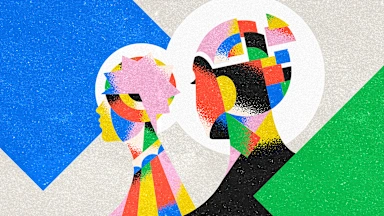We can’t control what’s coming. But we can navigate it by developing autonomy and a moral compass.
KEY POINTS
- We can’t eliminate threats, but we can cultivate agency to navigate an uncertain world.
- Autonomy without morality is dangerous; we need a moral compass.
- Stoicism builds autonomy and history provides moral wisdom. Together they create principled humans.
Right now, the future somehow manages to feel both deeply uncertain and terrifyingly dystopian. Society is polarized, and communities are fracturing. The news is dominated by reports of war. The job market is threatened by AI. Digital addiction is rising, mental health is suffering.
We can barely predict the threats, let alone eliminate them. The forces driving phenomena such as social polarization, wars, digital addiction, and AI are more powerful than any individual, and we cannot, as individuals, materially affect their overall direction.
So what can we do? How can we prepare ourselves to not just cope but actively thrive in a world that sometimes seems like it is on the verge of falling apart?
Intention Is the Foundation
As the Buddhist monk Pema Chodron emphasises, we must start where we are. In this context, it means accepting—truly accepting—that we can neither predict nor control the future.
Once we do this, we begin to experience what Chodron talks about: a sudden liberation of energy, because all the energy we put into denial is suddenly no longer needed for that purpose. Instead, we can use it to do what we need to do to thrive in whatever situation we are in.
What might this be?
Well, I don’t have a complete answer. But I am convinced that the foundation is developing the ability to live with intention. Intention is nothing other than the ability to make free and conscious choices, and when we are able to do this consistently, we become the authors of our own stories, protagonists who co-create the world rather than being determined by it. Intention allows us to live proactively rather than reactively—on our terms rather than someone else’s.
In a way, this is simply what freedom means: the ability to act with intention. And developing this ability is fundamental for meeting every threat we’ll face. For example, will we think critically or get swept up in tribal consensus? Will we recognize online manipulation or become digitally addicted? Will we use AI as a tool or become dependent on it?
In each case, the determining factor will be whether we are able to be free, whether we can respond with intention, with deliberate choice rather than impulse, with autonomy rather than compulsion.
In the end, this is about something more than success or even survival. It is about living an honorable, meaningful, and authentic life, a life that is truly ours and that we are proud to stand by.
Start With Stoicism
So how do we develop this ability?
One good place to start, I think, is with an ancient philosophy that has never been more relevant than it is today: Stoicism.
The Stoics taught a fundamental distinction: There are things within our control and things beyond it. We cannot control whether wars break out, whether economies collapse, whether technology disrupts everything we know. But we can control how we respond. We can control what we do and we can control who we are.
People who are able to live this truth have internal sovereignty. And that’s what Stoicism is designed to develop.
Stoicism teaches us to ask: What is within my control right now? Where can I act? What can I choose? And this simple practice helps us transform from reactive victims into intentional agents.
Cultivate a Moral Compass: History as the Learning Mechanism
History is full of people who were highly intentional actors but who chose to do terrible things with that autonomy. These people had internal sovereignty, but they lacked moral direction.
This points to something crucial: We don’t want to make just free choices. We also want to make good choices.
So, alongside internal sovereignty, we need something else: a moral compass. And history is a fantastic learning mechanism for developing this.
Why? Because history shows us the consequences of moral choices—not in theory but for real, across time and space, with real human beings affected by the outcomes. History provides us with an almost infinite source of real-life case studies from which we can learn. We see how individuals reacted to difficult circumstances and also how they took advantage of opportunities. And all of this is incredibly rich information that we can then apply in our own lives.
It is not that studying history will provide us with one perfect moral truth. Rather, the point of studying history is that it shows us possibilities, teaches us to recognize patterns, and thereby gives us knowledge that helps us make our choices today.
As the saying goes, wise men learn from other men’s mistakes, fools from their own. The student of history uses the whole world’s experiences to become wiser.
Practices to Start Today
How do we actually develop a moral compass and the ability to live intentionally?
Here are three practices you can begin immediately:
- Daily Stoic Reflection: End each day by asking: What was in my control today? How did I respond? What would I do differently?
- Ask the Pattern Question: When you encounter any strong claim—cultural, social, technological—ask: Has humanity tried this before? What happened? What patterns do I recognize?
- Create Space for Hard Questions: Make time weekly to discuss one hard question about ethics, morality, or meaning with someone you respect. No right answers required, just honest thinking about difficult issues.
Facing the Future
Whatever the future may bring, we can try to meet it as free and moral people, people who act with intention and maintain their principles even when the world feels like it may be falling apart.
That preparation begins with practicing Stoicism, which helps us live with intention. And it continues with the study of history, which helps us develop moral discernment and wisdom. Together, these practices develop something powerful: the ability to make free choices and the ability to use that freedom in service of things that really matter.
[Photo: Prokopchuk/Adobe Stock]
Original article @ Psychology Today.
















